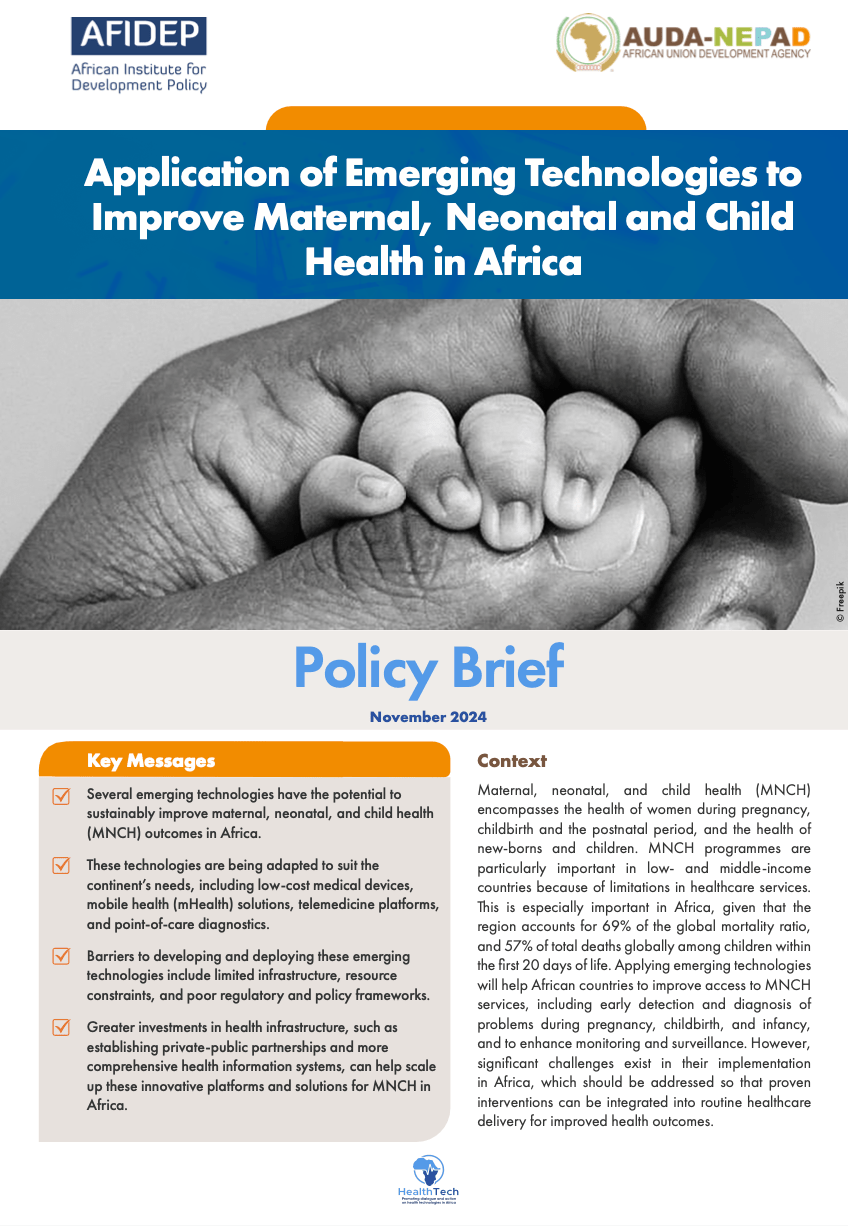Deploying Emerging Technologies to Improve MNCH in Africa
Maternal, neonatal, and child health (MNCH) focuses on the well-being of women during pregnancy, childbirth, and the postnatal period, as well as the health of newborns and children. Maternal health includes prenatal care, skilled attendance during birth, and obstetric care to manage and prevent complications, as well as postnatal care. Neonatal health pertains to the care of newborns within the first 28 days of life, addressing safe delivery, newborn care, and complications related to prematurity, low birth weight, and birth defects. Child health encompasses the overall physical, mental, and social well-being of children from infancy through adolescence, aiming to prevent illnesses and manage childhood diseases, support healthy development and provide immunisations.
The integration of emerging technologies in MNCH is vital for enhancing healthcare access, improving early detection and diagnosis, and advancing monitoring and surveillance during pregnancy, childbirth, and infancy.
Benefits of Applying EHTs to MNCH in Africa
Emerging technologies offer significant promises for advancing MNCH in Africa. For instance:
- AI tools predict health outcomes and identify high-risk pregnancies, enabling early intervention and improved outcomes for mothers and children.
- Blockchain technology ensures data integrity, privacy, and interoperability in managing electronic medical records and health information exchanges.
- IoT devices, including wearables, track vital signs and foetal movements, enhancing remote care.
- 3D printing enables the creation of affordable medical devices and prosthetics, including neonatal incubators
- Drones improve logistical support and access to healthcare services in remote areas
- Robotic surgery offers minimally invasive options, while telemedicine provides remote consultations and care.
Examples of Application of Emerging Technologies in MNCH in Africa
- Ghana uses social media to raise awareness about maternal and child health.
- Ghana’s Mobile Midwife programme delivers health information and support through mobile phones.
- Ghana employs Internet of Medical Things devices to monitor neonatal health and detect abnormalities.
- In Kenya, mHealth platforms enhance neonatal care by providing health information and support to parents. For example, Kenya’s M-TIBA platform uses mobile technology for prenatal care and child growth tracking
- In Kenya, maternal and child health services integrate the use of portable diagnostic tools, such as ultrasound machines.
- Rwanda’s Babyl platform and Ethiopia’s telemedicine efforts provide remote care for maternal health.
- Nigeria’s MomCare app supports pregnant women and new mothers with health tracking and advice.
- South Africa uses AI to predict complications during pregnancy and early childhood.
- Tanzania secures maternal health data with blockchain technology.
- Tanzania’s Wazazi Nipendeni programme offers essential maternal and child health information via SMS.
- Uganda’s mTrac system tracks immunisation services via mobile technology.
- Uganda uses solar-powered devices for maternal care in areas with limited electricity.
Policy Recommendations for Africa to Leverage Technology in MNCH
- Develop comprehensive national e-Health strategies
- Establish regulatory frameworks for digital health solutions
- Invest in healthcare infrastructure to support technology deployment
- Encourage data interoperability and sharing
- Invest in training for healthcare workers in digital health
- Promote public-private partnerships for technology adoption
- Ensure equitable access to technologies for underserved communities
- Monitor and evaluate the impact of technologies on MNCH outcomes.
Integrating emerging technologies into maternal, neonatal, and child health (MNCH) has the potential to transform these services in Africa, and to significantly enhance healthcare access, early detection, and monitoring. If well implemented, the continent can harness the power of technology to improve MNCH outcomes and address critical healthcare challenges.
